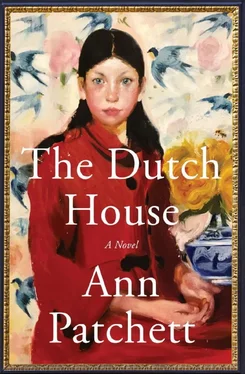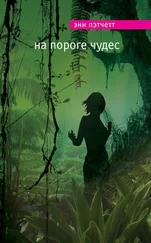“Why don’t you say goodbye to me before you leave?” Maeve would ask her, and our mother would just shake her head.
“I could never do that. Never in a million years could I say goodbye to you.”
Was our mother sick? Was she getting worse?
Maeve nodded. “She was turning into a ghost. One week she was thinner, then she was paler, everything deteriorated so fast. We were all folding up. Mommy would come home and cry for days. I would go and sit with her in her bed after school. Sometimes you’d be in the bed with her, playing. Whenever Dad was home he always looked like he was trying to catch her, like he might as well have been walking around with his hands out. Sandy and Jocelyn and Fluffy, they were all nervous as cats by then, but no one talked about it. When she was gone it was unbearable and when she was home it was unbearable in a different way because we knew that she was going to leave again.”
When finally she did leave again, Maeve asked our father when she was coming back. He looked at her for a very long time. He didn’t know what part of the truth he was supposed to tell a ten-year-old, and what he decided on was the whole thing. He told Maeve our mother wasn’t coming back. She had gone to India and she wasn’t coming back.
Maeve could never make up her mind what part of this story was the worst: that her mother was gone or that India was on the other side of the planet. “No one goes to India!”
“Maeve,” he said.
“Maybe she hasn’t left yet!” She didn’t believe him, not for a minute, but if the story had been started it needed to be stopped.
Our father shook his head but he didn’t reach for her. Somehow that might have been the strangest part of all.
This was the story of our mother leaving, and this was the point at which the story stopped. There should have been questions, explanations. If she was in India our father should have gone to find her and bring her back, but none of this happened because Maeve stopped getting up in the morning. She wouldn’t go to school. Sandy would bring her Cream of Wheat on a tray and sit on the edge of her bed, trying to talk her into taking a couple of bites, but she said Maeve was rarely persuaded. Everyone saw it as the understandable sickness of a girl longing for her mother. They were all suffering from some related version, and so they let the child sink down into it, never really thinking about the fact that she would still drink her orange juice, and drink her glass of water, and drink the entire pot of chamomile tea. She’d take her cup into the bathroom and fill it over and over again, until finally she stuck her head in the sink and drank from the running tap. Fluffy would bring me into Maeve’s room and put me in her bed and Maeve would read me a story before falling back to sleep. Then one afternoon, less than a week after our mother left for good, Maeve didn’t wake up. Fluffy shook her and shook her and then scooped Maeve up in her arms and ran down the stairs and out to the car.
Where was everyone then? Where had our father and Sandy and Jocelyn gone? Where was I? Sandy said she couldn’t remember. “Such a terrible time,” she said, shaking her head. What she knew was that Fluffy drove Maeve to the hospital and carried her into the lobby where some nurses took the sleeping child from her arms. She stayed in the hospital for two weeks. The doctors said the diabetes could have been brought on by trauma, or it could have been a virus. The body had all sorts of means to deal with what it couldn’t understand. In the hospital, Maeve swam in and out of consciousness while they worked to stabilize her blood sugar. Everything that happened to her was part of a dream. She told herself her mother wasn’t allowed to visit, a punishment meted out to both of them for something she had done and couldn’t quite remember. The Sisters of Mercy, all friends of our mother’s, came to see her. Two girls from Sacred Heart presented her with a card signed by the entire class, but they weren’t allowed to stay. Our father would come in the evenings, though he said very little. He would hold Maeve’s foot through the white cotton blanket and tell her that she needed to get better now, no one was up for this. Jocelyn and Sandy and Fluffy took turns staying with her in the room. “One of us for you, one for your brother, and one for your father,” Sandy would say. “Everyone’s covered.” Sandy said that when she needed to cry she would wait until Maeve was asleep, then she would go out to the hall.
After Maeve came home from the hospital things got worse. Logic said our mother’s absence had made her sick, and so logic concluded that further talk of our mother could kill her. The Dutch House grew quiet. Sandy and Jocelyn and Fluffy devoted themselves to my sister, the needles, the insulin. They were terrified of the way every injection changed her. Our father would have nothing to do with it. Fluffy, who in those weeks slept in the bed with Maeve, ended up taking her back to the hospital in the middle of the night. Again, they worked to stabilize her, again they sent her home. Maeve would cry and cry until my father would come into her room and tell her to stop. They had all become characters in the worst part of a fairy tale. He was now a hundred years old. “Stop,” he would say, as if he could barely make the words. “You have to stop.”
And finally, she did.
Nearly two years into her irregular tenure, Andrea walked in the house one Saturday afternoon with two small girls. Say what you will for Andrea, she had a knack for making the impossible seem natural. I wasn’t clear about whether it was only Maeve and I who were meeting her daughters for the first time, or if the existence of Norma and Bright Smith was news to our father as well. No, he must have known. The very fact that he didn’t look at them meant they were already familiar. They were much younger than me. Bright, the smaller of the two, looked like she should have been on a Christmas card, fair like her mother with flushed cheeks and blue eyes, a big smile for everyone. Norma had light-brown hair and green eyes. She was no match for her shining sister, if only because she was so serious. Her lips stayed pressed together in a straight line. Clearly it was Norma’s job to look after things.
“Girls,” their mother said, “this is Danny, and this is his sister Maeve.”
We were shocked, of course, but in our heart of hearts we were happy too, certain that the Smith girls would spell the end of Andrea for good. Our father wasn’t about to put up with two more children in the house, especially not two more girls. Who had been taking care of them on all those Saturday nights she’d come to dinner, never once mentioning she needed to get home? This would not be forgiven. When we stood at the door and said goodbye to the three of them after what had been a comparatively brief visit, we thought that we were saying goodbye for good.
“ Sayonara , Mrs. Smith,” Maeve said that night in the bathroom as she put the toothpaste on my toothbrush and then hers. I was perfectly capable of handling a tube of toothpaste but this was our ritual. We brushed our teeth together then said our prayers.
“ Buenas noches , Bright and Norma,” I said. Maeve looked at me for a second, not believing I’d come up with that, then she started laughing so hard she barked like a seal.
Maeve and I were forever under the impression that we were moments away from cracking the code on our life, and that soon we would understand the impenetrable mystery that was our father, but we’d misread the appearance of Andrea’s daughters completely. It was not some half-baked introduction. The final disclosure that Andrea came as a package deal was proof that she had fully assimilated, and we, somehow, had missed it. Soon the girls were regulars, sitting with us at the dinner table or taking off their socks to splash their feet in the swimming pool—neither of them knew how to swim. It felt strange to have other children around. Maeve and I both had friends at school but we went to their houses for parties and studying and sleep-overs. No one ever came to the Dutch House. Maybe it was because we didn’t want to draw attention to our motherless state, or we feared the house would subject us to ridicule, but really, I think we understood that our father didn’t like children, which was why it made no sense that he’d let these two in.
Читать дальше





![Энн Пэтчетт - Прощальный фокус [litres]](/books/402782/enn-petchett-prochalnyj-fokus-litres-thumb.webp)






